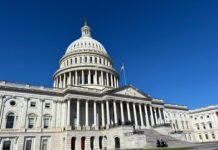
Sen. Jon Ossoff stopped by Atlanta’s Grady Memorial Hospital Thursday to promote the $1.9 trillion COVID-19 relief bill working its way through Congress and pitch a provision within it to encourage states like Georgia to expand Medicaid coverage to more of its citizens.
“Medicaid expansion will help more Georgia families afford health care,” Ossoff told reporters after touring the hospital’s facilities. “It will also help sustain hospitals like this one, and health care providers across the state of Georgia. And getting that Medicaid expansion incentive into the legislation is a top priority.”
Lawmakers in Congress are hoping to tempt Georgia and the 13 other states that have not expanded the health care program with incentives tucked into the bill. Ossoff said Thursday pushing the bill with Medicaid expansion incentives is at the top of the to-do list for him and fellow freshman Sen. Raphael Warnock.
If Georgia fully expanded Medicaid with the federal government absorbing 95% of the tab, the state could cover more than 350,000 of the over 400,000 uninsured people living in Georgia, according to Georgians for a Healthy Future.
GOP lawmakers have so far resisted the expansion, citing its cost. Gov. Brian Kemp signed an agreement with the Trump administration in October for a more modest Medicaid expansion called Georgia Pathways that would cover about 50,000 Georgians and include a work requirement. But the administration of President Joe Biden put a stop to the state’s plans, at least temporarily.
If the incentives become part of the bill, state Republicans will have an ethical obligation to expand the program, Ossoff said.
“It will be the moral obligation of political leadership at the state level, to take the steps necessary to expand Medicaid, and what Sen. Warnock and I are working to do is to give Georgia a do-over at this so that they will be able to benefit from even better incentives than they would have gotten had the state of Georgia expanded Medicaid when the Affordable Care Act was first passed,” he said.

For eight years, Georgia’s GOP leadership has rejected full Medicaid expansion as too expensive, a long-term obligation the state can’t afford even when the federal government covered 100% of the cost at first. Ossoff said it’s time for Georgia to accept the billions in federal assistance that will pay for the bulk of covering the state’s uninsured poor.
“This has to be a collaborative bipartisan effort with Republican leaders in the state of Georgia, and Senator Warnock and I are working to ensure that these incentives are included in this bill to make it an even better deal for Georgia state Government,” he added.
Ossoff said he will continue to support a minimum wage increase to $15 an hour as part of the legislation, another potential sticking point for the relief bill.
Ossoff also touted the bill’s ambitious vaccination distribution plan.
“This legislation will include significant investment in making more vaccine available to the American people so that by midsummer, if not before, there are enough doses to get everybody immunized,” he said.
Georgia’s vaccine distribution plan has had a bumpy rollout. To get things on a smoother path, Georgia plans to open four mass vaccination centers across the state, Kemp announced Thursday, with sites in Albany, Macon, Habersham County and the Delta Flight Museum at the Atlanta Airport.
The state-run sites are set to open Monday and will initially administer about 22,000 shots per week, but more sites will open as additional doses become available, said Georgia Emergency Management and Homeland security Director James Stallings.
The state also announced a new website where residents can pre-register for the vaccine. Only health care workers, first responders, long-term care staff and people 65 and older are able to sign up, and getting shots at the sites is by appointment only. The department of public health will be completing plans to expand eligibility to other Georgians including frontline workers within the next two weeks, Kemp said.
Georgians who are not eligible now can sign up to receive updates and notifications when they become eligible.
The state ranks 46th in the nation for the percentage of vaccine allotment distributed according to the Becker Hospital Review. Kemp disputes that ranking, pointing to a lag in data and inconsistencies in counting vaccines shipped.
“As of today, providers and public health districts continue to see higher demand than we have in supply,” Kemp said at Thursday’s news conference. “We were also seeing steady increases in our weekly allotment of doses. Next week, we are expected to see 198,000 first doses sent to the state for distribution and administration.”
The state has been receiving about 268,000 first and second doses, according to Georgia Public Health Commissioner Dr. Kathleen Toomey.
Kemp has also faced political pressure from Democrats and teachers groups to add educators to the list of eligible vaccine recipients. Kemp has refused, citing the elevated death toll COVID-19 has on Georgians 65 and older.
Teachers are set to be among the essential workers included in the next phase, but a survey sent to school districts across the state showed only 45% of school staff want to be vaccinated, Kemp said.
“I think it shows in the survey that there’s not as much demand there as some may have thought, but it does help us with the planning,” he said.
The state has been seeing a slow and steady increase in the number of vaccines received per week, Toomey said. More importantly, the number of vaccines shipped is becoming more consistent, allowing public health workers to organize the mass vaccination sites, she added.
The recent severe weather in other parts of the country has delayed some shipments, but Georgia will still receive those doses, she said.
“The vaccine is shipped directly from Pfizer, so from Michigan, where there’s considerable snow as well as from Moderna, which must pass through Nashville,” she said. “Nashville has been really locked in for the last several days, so the vaccine that we anticipated this week is delayed and we anticipate it will come at the end of the week, or at the latest early next week, so we will have extra doses next week.”







